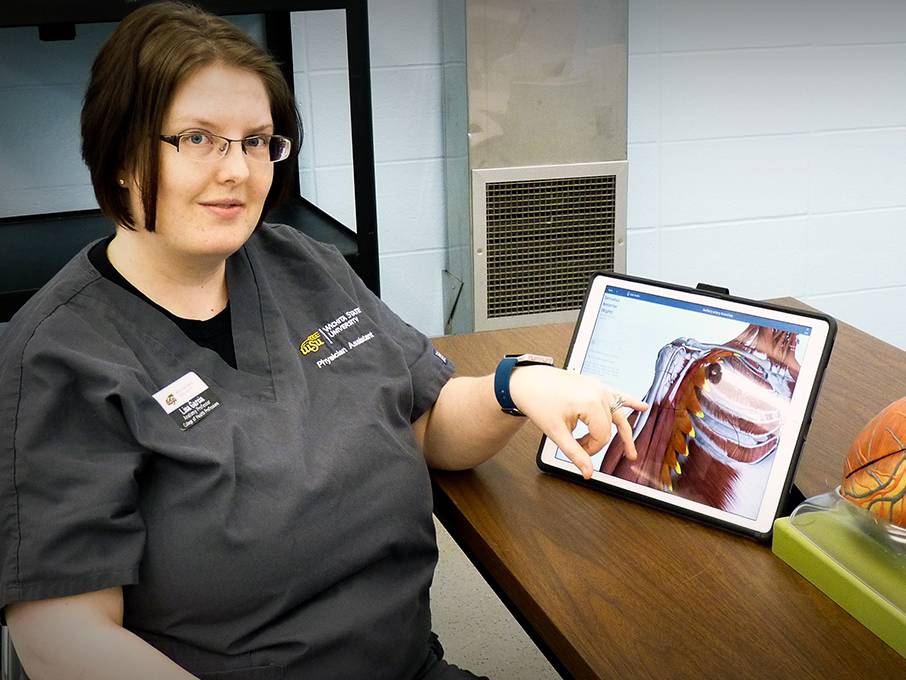The cadaver lab in the College of Health Professions (CHP) at Wichita State University is filled with models of body parts, various tools and donated bodies that are preserved in shiny, metal tanks. Lisa Garcia, clinical educator in the CHP, says the lab is an important part of the curriculum, but most people on campus don't even know it exists.
“The lab has managed to stay off most people's radars, but it's an extremely valuable
tool for health professions students.”
Wichita State has one of only two anatomy labs in the Wichita area that uses cadavers.
The lab, located on the first floor of Ahlberg, is primarily used by students in the
Physician Assistant and Physical Therapy programs, but serves as a valuable educational
tool for all students in the College of Health Professions.
The lab gives students vital hands-on experience working with actual human organs
and structures. The cadavers, referred to as “donors” by lab staff, come from the University of
Kansas School of Medicine's Willed of Body program. The program receives approximately
270 donors per year and distributes the cadavers to various schools nationally for
a one-year time period. The donors are anonymous and vary in age, gender and cause
of death. WSU receives 12 cadavers each year.
Garcia says there is a huge demand and short supply of donors.
“There are countless ways that donors help advance medical education and research,”
she says. “Body donation is often stigmatized, but it provides the foundation to save
many lives.”
Valuable benefit
Garcia says traditional and online tools are greatly enhanced by the active learning
in the lab. Students are able to observe tendons, muscles and body parts they are
studying in class. They can see firsthand how everything functions and interacts with
each other through an experience that a textbook or simulation cannot replicate.
“There are many variables and conditions that impact a patient such as prosthetics,
past surgical procedures, genetic backgrounds and varying activity levels when they
were alive,” she says. “It's hard to simulate real-life.”
Garcia says having the lab is a unique benefit that most institutions don't offer.
“We're fortunate to be able to give students the opportunity to see real-life anatomical
differences and a tactile way to learn superficial aspects such as the thickness,
deepness and heaviness of different parts.”
Building a bond
Each May the new donors arrive at WSU and the previous donors are returned to the
University of Kansas School of Medicine where they are cremated and the ashes are
sent to the families. The School of Medicine hosts a memorial service every fall for
donors' families that Garcia attends whenever possible.
Students often bond with the donors throughout the semester, giving them nicknames
and backstories.
“Since we work so much with them it's easy to become attached,” she says. “They kind
of become like family.”
Garcia requires her students to write a pathology report at the end of the semester
on their findings and thank you letters to the donors and families. She says it's
a way to sum up what they learned, but also an opportunity to show respect and close
the chapter on the donor. She says it also prompts students to start the difficult
conversation about death with their families.
“It's not something that anybody wants to talk about, but it's an important discussion
that people need to have with their loved ones.”
Garcia provides tours of the lab for high schools, colleges and various WSU departments.
She points out the major renovations the lab underwent in 2014, including a fresh
coat of blue paint, new rubber floors, bookshelves and a projector. The rubber floors
are scratch resistant and make cleanup easy. The floor is also sealed which makes
the temperature and humidity levels in the room easier to control.
“The improvements and upgrades have been really nice,” she says. “I'm proud of the
lab and enjoy letting people in on one of campus's best-kept secrets.”


 Wichita State University
Wichita State University